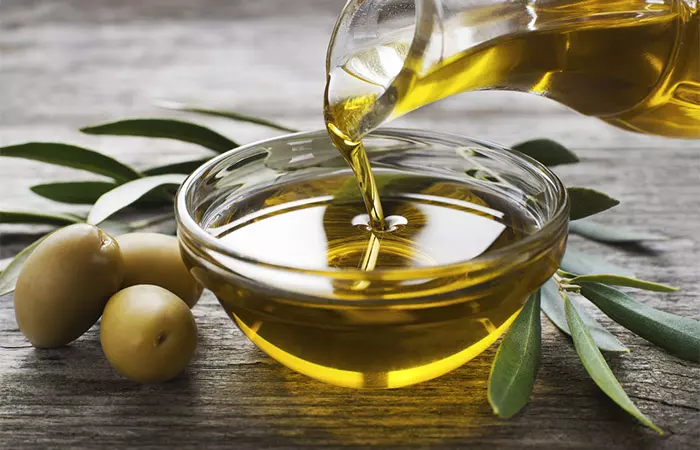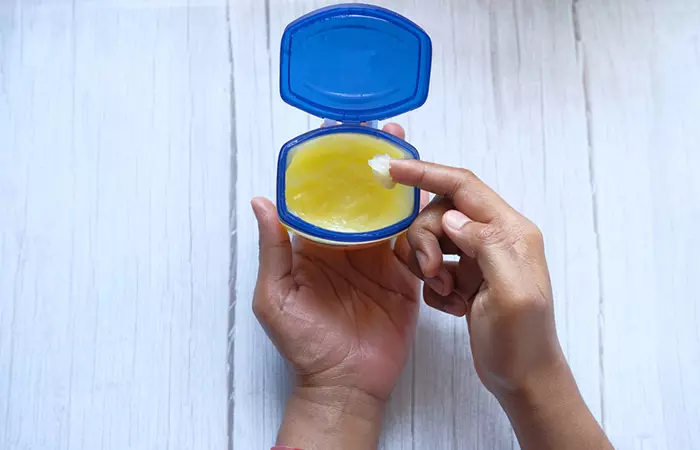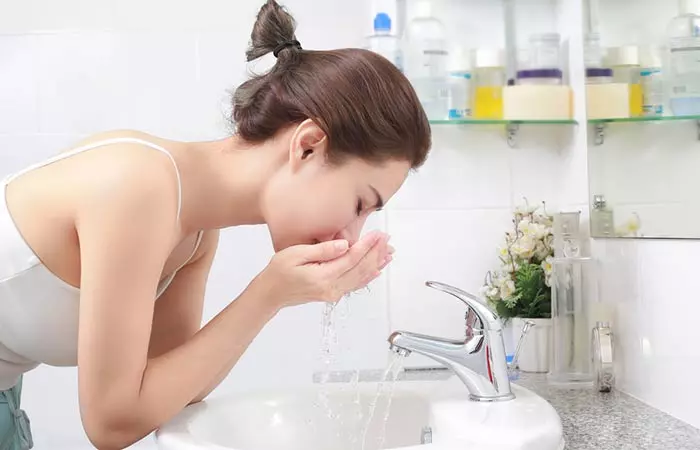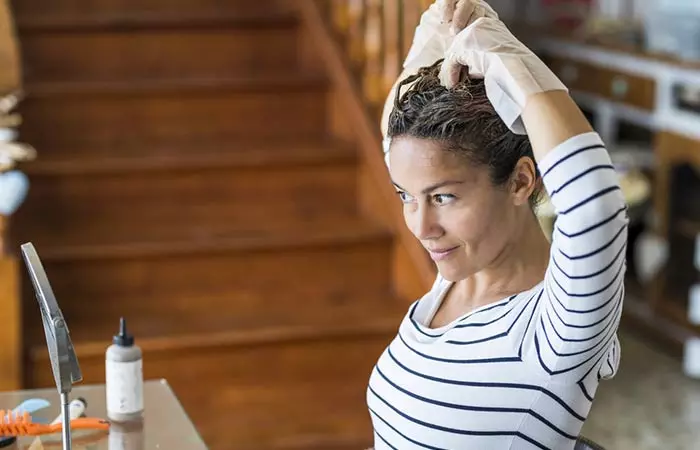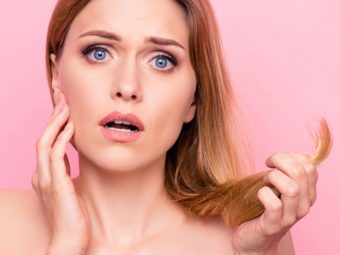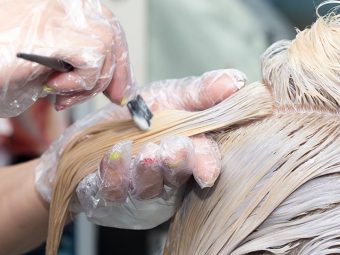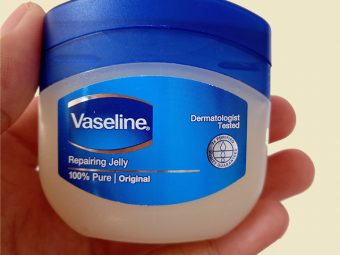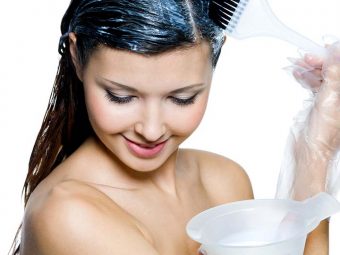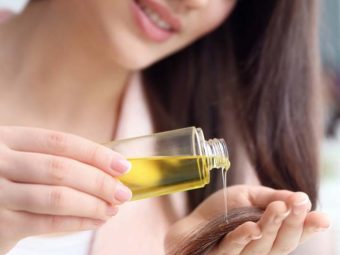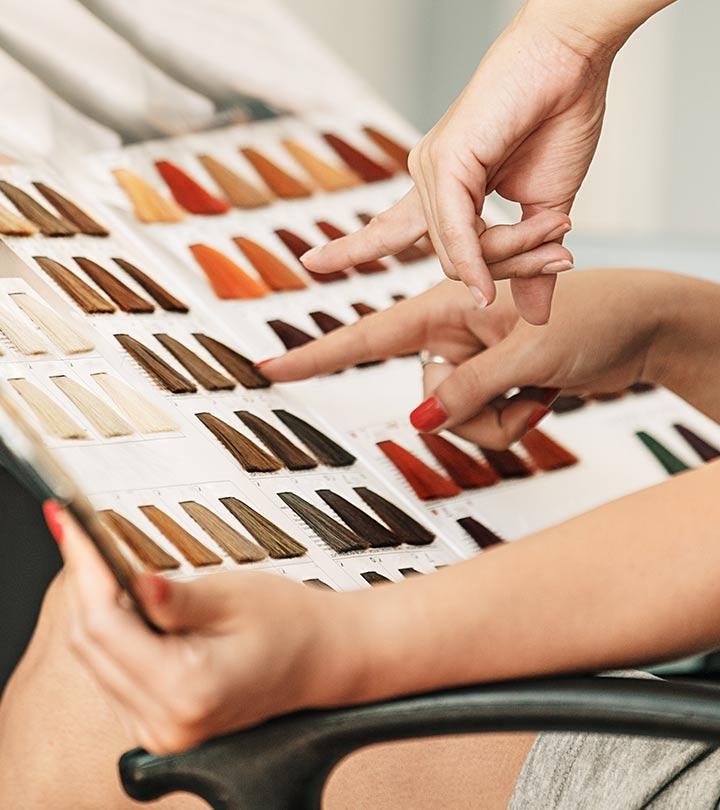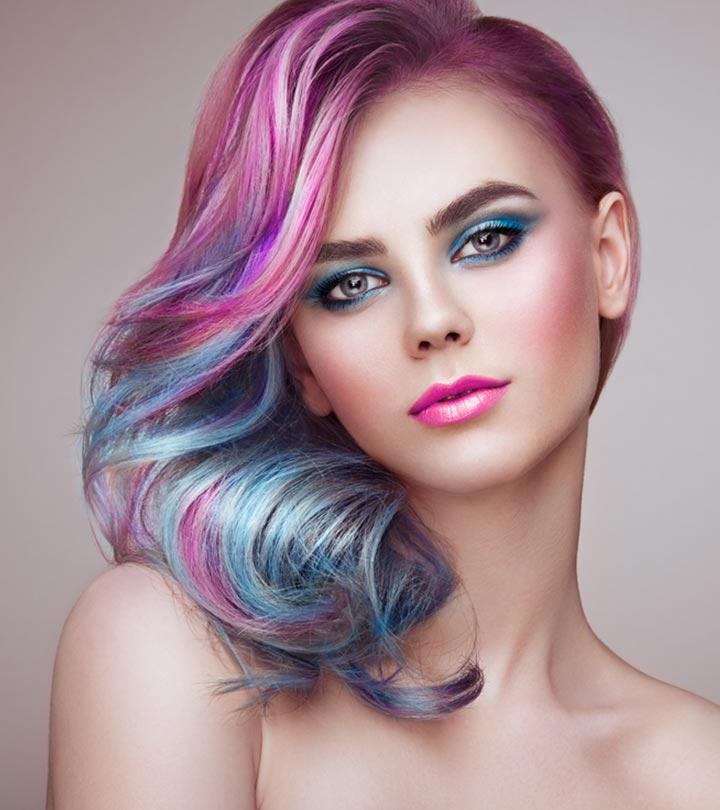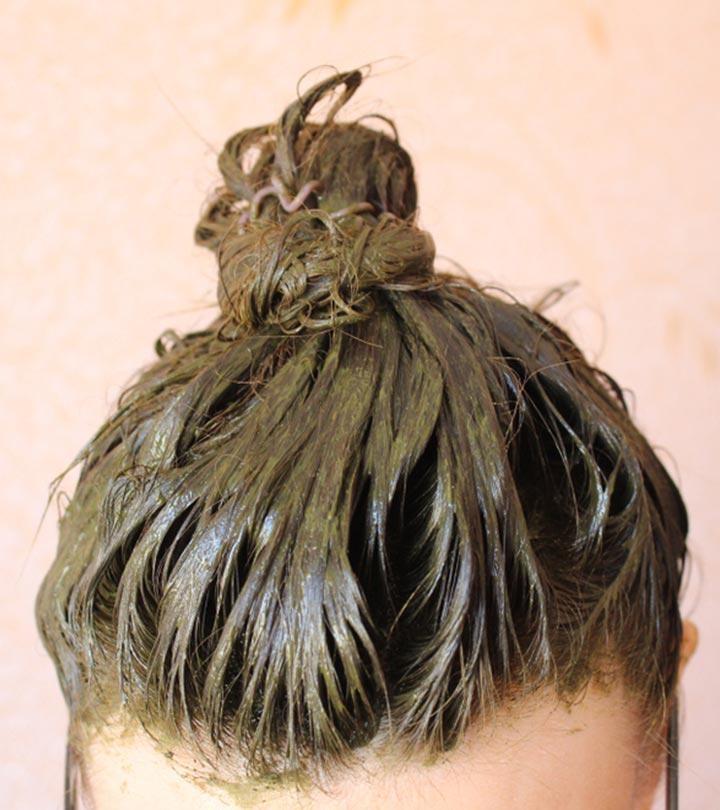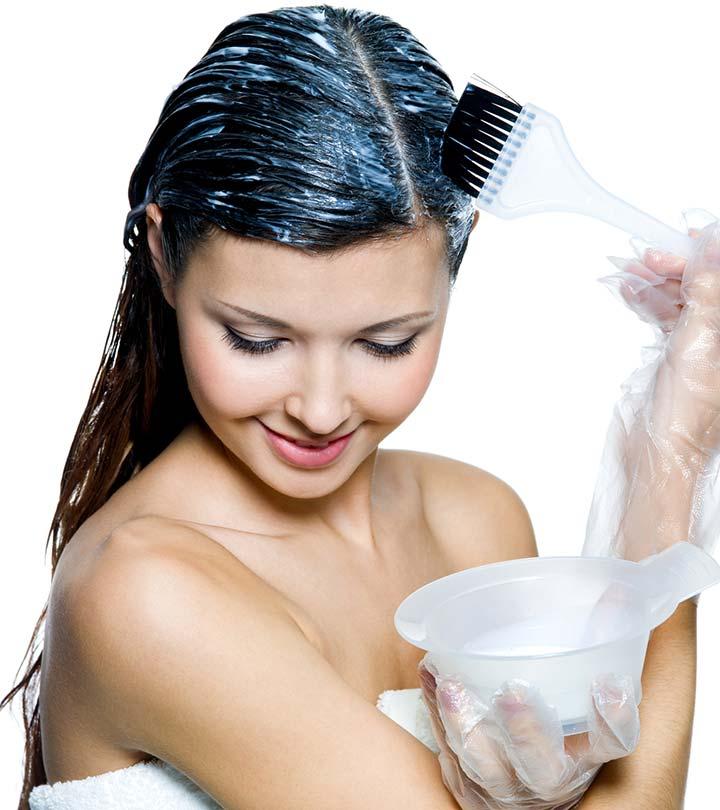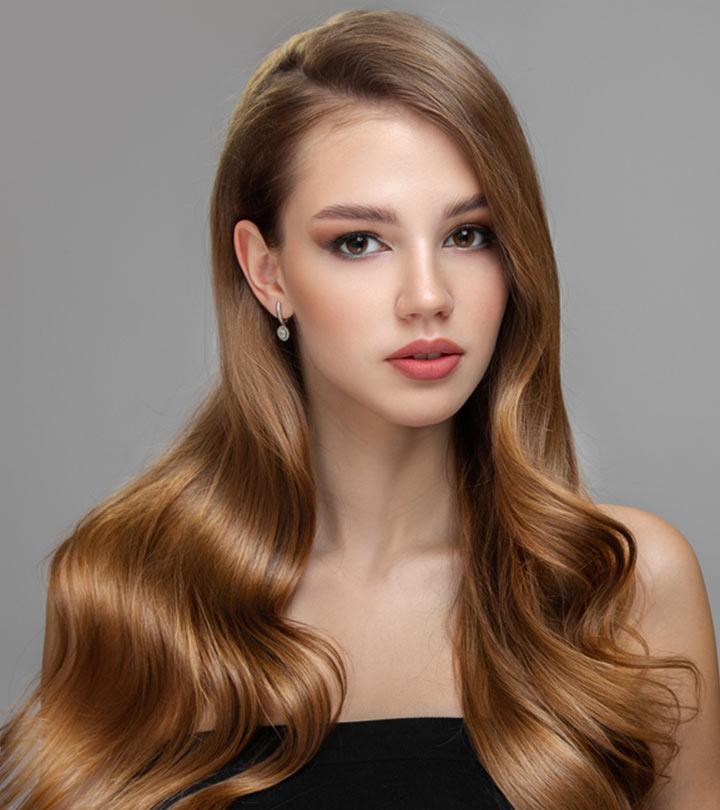10 DIYs To Remove Hair Color Stains From The Skin
When you're trying to dye your hair at home, oil or petroleum jelly can come in handy.
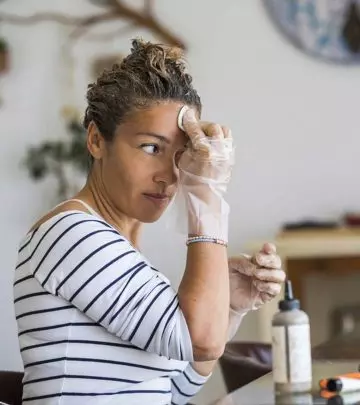
Image: Shutterstock
It’s enticing to color your hair at home instead of going to a professional. On the other hand, hair color stains on the skin are something that few of us are ready for. So, how can you remove hair color stains from your skin? After all, these stains are quite difficult to remove. Fortunately, there are methods for removing hair dye spots from the neck, sides of the face, ears, behind the head, and hands. Keep reading to learn how to remove hair color from the skin at home. Keep scrolling!
In This Article
How To Remove Hair Dye From Your Face
Let’s begin with how to rub off the hair color stain from your face, including the forehead, hairline, neck, back of the head, and ears. Remember, the skin on your face is delicate. Do not use harsh chemicals or rub vigorously as it will irritate the skin. Check out these hacks if soap and water did not get rid of the dye stains on your skin completely.
1. Olive Oil Or Baby Oil
Olive oil and baby oils are great cleansing oils. Cleansing oils do not irritate the skin or cause dryness as compared to regular cleansers (1). Baby oil is gentle on the skin, while olive oil has antioxidant, anti-inflammatory, and hydrating properties (2). Hence, it is safe to apply olive oil and baby oil to remove hair dye stains.
Dab olive or baby oil on a cotton ball or pad. Apply it to the stained area in a gentle circular motion. Do this twice a day for 1-2 minutes. Apply refrigerated aloe vera gel to soothe the skin.
2. Vaseline Or Petroleum Jelly
A study states that medicinal Vaseline or petroleum jelly can seal and protect the skin for at least 6 hours (3). It also locks in moisture and keeps the skin soft and supple.
Massage Vaseline or petroleum jelly onto the stained area in gentle, circular motions. Use soft cotton pads or wipes to remove the color stains from your face. Apply refrigerated aloe vera gel to soothe the skin.
Note: Avoid Vaseline if you have oily or acne-prone skin.
Melanie, a YouTuber, shared her personal opinion and experience on how she likes to combat the common problem of getting hair color stain on the skin. She states in her vlog, “These are just tips and tricks that I have learned over the years of doing my own hair…. Now the easiest and quickest way to prevent getting hair dye on your skin is by using a layer of petroleum jelly…. And you just put it along your hairline, you can put it on your neck, you can put it on your ear, and that will prevent the hair dye from getting on your skin (i).” However, Melanie states that she is not a fan of how petroleum jelly feels on her skin, and hence prefers to use 70% rubbing alcohol to great success as well.
3. Face Wash With Scrubbing Granules
Face cleansers help clean dirt, grease, and excess oil to improve the overall health of the skin (4). Gentle, non-comedogenici XSkincare products or cosmetics that do not clog the pores on the skin, making them suitable for all skin types. , and moisturizing face cleansers with scrubbing granules help exfoliate the dead and dry skin without irritating it.
Use a face wash with scrubbing granules that suits your skin type. Splash water on your face and massage a coin-sized amount of the face wash onto the stained areas for at least two minutes. Wash off with water and apply refrigerated aloe vera gel or a soothing moisturizer. Repeat this twice a day.
4. Makeup Remover
Natural, oil-based makeup remover is the best non-toxic home remedy to get rid of water-resistant, long-wearing makeup. The active ingredients in these removers help dissolve the impurities and keep your skin clean, makeup-free (Thus, a makeup remover might help get rid of hair color stains on your face (5).
5. Toothpaste Or Toothpowder
Toothpastes and tooth powders contain “whitening” ingredients that help get rid of the yellow stains on teeth (6), (7). You can harness this stain removal power to get rid of unwanted hair dye stains on your face. However, it might worsen acne, cause dermatitisi XIt is a general term used to describe inflammation or irritation of the skin that involves rashes, and dry and itchy skin. , and irritate facial skin.
Dab toothpaste or tooth powder on the stained area. Use a damp cloth or cotton pad to rub the area in a gentle, circular motion for 2 minutes. Wash your face and apply a soothing moisturizer.
Note: Do not touch your eyes or nose without washing your hands. Avoid toothpaste or tooth powder if you have dry or sensitive skin.
6. Rubbing Alcohol
Rubbing alcohol can also work as a hair color removing agent. However, if you have dry and sensitive skin, avoid using it on your face. If you have oily or normal skin, dab a little rubbing alcohol on a cotton pad and massage the stained area in a circular motion. Wash your face with a gentle cleanser and warm water. Apply a moisturizer to prevent dryness.
 Quick Tip
Quick TipIf you have hair dye stains on your hands, use the following methods to get rid of them.
How To Remove Hair Dye From Your Hands
Note: Do NOT use these cleaning ingredients on your face as they may irritate and damage the skin. Avoid them if you have sensitive skin and eczemai XA general term used to indicate inflammation of the skin, along with itchiness and dryness. It is often caused by irritants or allergens. or dermatitis. Instead, try preventive measures.
7. Liquid Laundry Detergent
Liquid laundry detergents remove stains effectively, and you can use them on your hands for hair dye removal. First, apply baby oil to your skin to prevent any irritation and redness. Dab some liquid laundry detergent on a soft, damp cloth. Rub it on the hands gently in circular motions. Wash with lukewarm water and apply aloe vera gel to soothe the skin.
You can also mix bleach and soap for very stubborn areas, but remember that bleach can be harsh on sensitive skin.
8. Dish Soap And Baking Soda
According to research, baking soda is an effective whitening agent and helps remove stains on teeth (8), (9). Dish soap contains detergents, surfactantsi XSurface active agents that help lower surface tension and increase the solubility of organic compounds. Often used in detergents. , preservatives, fragrance, and colorants. The combination of dish soap and baking soda can make for a potent stain remover.
Mix a pinch of baking soda in a dollop of dish soap. Apply it to the stained area and rub gently using a soft, damp cloth. Rinse off and apply a moisturizer.
9. Nail Polish Remover
Nail polish removers are made of acetone, isopropyl alcohol, and other ingredients that help wipe away nail polish. You can also use them if a small area on your hand is stained with hair dye.
Dab nail polish remover on a cotton ball and gently rub it on the area in circular motions. Wash with soap and water and apply moisturizer.
10. Hairspray
Hairsprays are composed of copolymers of polyvinylpyrrolidone (PVP) and polyvinyl acetate (PVAc) and different alcohols. If you have hair color stains on your hands or any other body part except the face, spray it on the stained area and rub gently to remove the stains.
 Quick Tip
Quick TipThese are the 10 ways to get rid of stubborn stains on your skin. You can also use lemon or vinegar to remove the hair color from the skin as the acid content breaks down the hair dye. The next time you dye y
How To Avoid Staining Your Skin With Hair Dye
- Vaseline/Olive Oil: Vaseline or olive oil is an effective stain guard. Apply Vaseline or olive oil on your hairline, neck, ears, back of the head, and hands before dyeing your hair to prevent it from staining your skin.
- Gloves: Always wear gloves on both hands while dyeing your hair to protect your fingers, fingernails, and hands.
- Tissues: Keep a few tissues handy to blot the hair dye if it drips down your face or neck.
- Hair Clips: Sometimes, body heat can make the hair dye run down the neck and back of the head. To avoid that, twist the hair up and pin it with a hair clip.
- Towel: Wrap a towel loosely around your neck to protect your chest, back, and clothes from getting stained. It also helps to wipe away the dripping hair color.
Here are a few points on how to get hair dye off the skin while coloring your hair at home.
Points To Remember
- Do not use harsh chemicals like dish soap or nail polish remover on your face. These products dehydrate and irritate the skin. You may use a small amount on your hands if Vaseline, olive oil, and makeup remover do not work.
- Exfoliate your face and hands using a gentle cleanser, scrub, or chemical peel.
- NEVER rub your skin harshly – use gentle, circular motions.
- Wash your skin with lukewarm water after removing the hair color stain. Follow it up with a moisturizer or refrigerated aloe vera gel to soothe the skin.
Note: If you have tough dye stains and none of the hacks mentioned above work, opt for professional dye removal.
Now that you know how to remove hair color stains, the most important question remains; do hair dyes cause cancer? Scroll down to the next section to learn more.
Does Hair Dye Cause Cancer?
Hair dye has long been a subject of concern regarding its potential link to cancer. Research suggests that some hair dyes contain chemicals called aromatic amines that may increase the risk of bladder cancer (10). A study by the National Institute of Environmental Health Sciences (NIEHS) found that women who frequently used permanent hair dye the year before joining the study were 9% more likely to develop breast cancer than women who didn’t. It was further found that African American women regularly using hair dye had a 60% increased risk of breast cancer as compared to an 8% increased risk in white women (11). Use hair dyes in a well-ventilated area, follow product instructions, and consider natural or ammonia-free dyes to minimize the potential risk.
Infographic: DIY Face Scrub To Remove Hair Dye Stains From The Skin
We know how difficult it is to remove hair color stains from your skin. The good news is you can remove those pesky color stains easily with the right facial scrub. Additionally, the scrub will remove dead cells and grime without irritating your skin.
Check out the infographic below to learn the recipe. Illustration: StyleCraze Design Team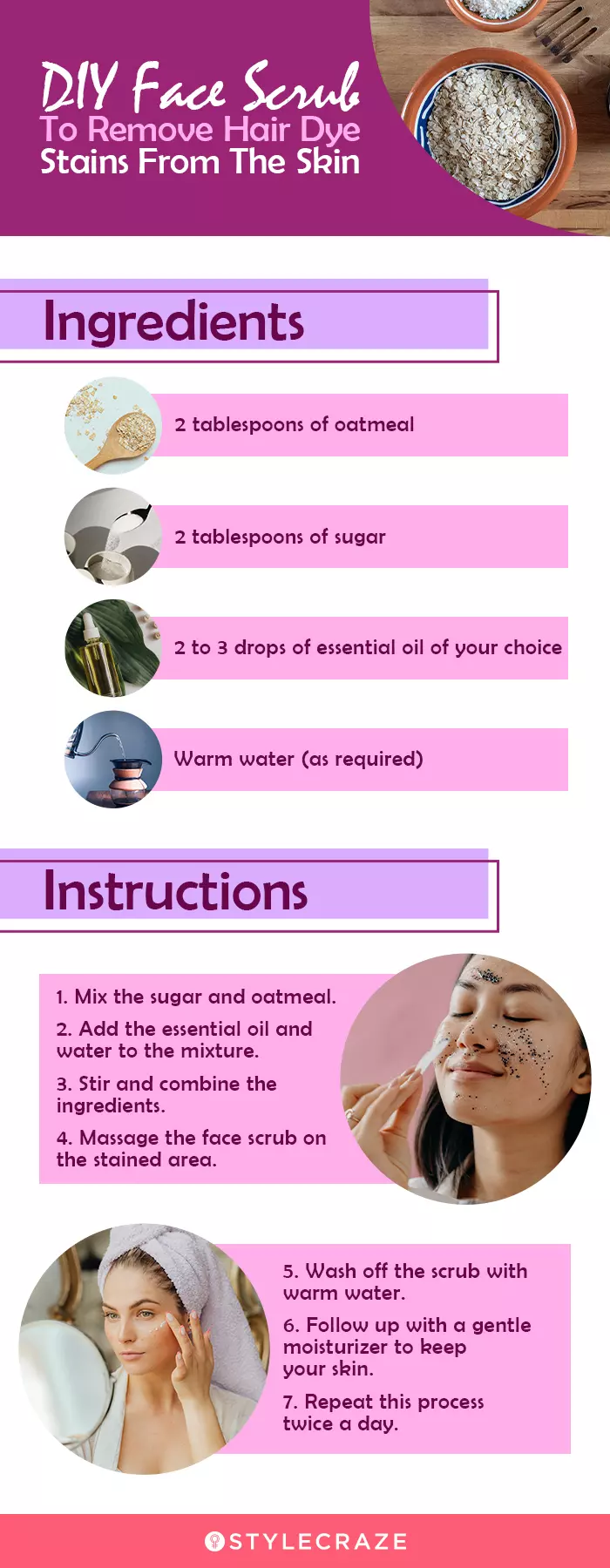
Isn’t it fun to experiment with different hair colors? Hair dye gives your appearance a splash of color. However, coloring your hair every month in a salon can be costly, so many people do it at home. Although DIY hair dyeing is cost-effective, it can be messy. It will leave color stains all over, including on your skin. When you have to go out the next day, you can’t wait for the stain to fade away on its own. As a result, one of the methods indicated above can be used to remove hair color stains from the skin. If the stain persists after attempting at-home remedies, consult a color specialist at a salon. They should be able to take care of it.
Frequently Asked Questions
How long does hair dye stay on the skin?
Hair dye may stay for a day or two on your skin. It will fade quickly if you use Vaseline, olive oil, or a makeup remover.
Does Vaseline remove hair dye from the skin?
Yes. Vaseline helps remove hair dye from the skin without any irritation.
Does milk remove hair dye from the skin?
Milk will not remove hair dye from the skin. However, add two drops of lime to cold milk and rub it on the skin gently to fade away the hair color stain.
Can hair dye permanently stain the skin?
No, hair dye will not permanently stain the skin. However, it may take some time to fade away. Use Vaseline, olive oil, or a makeup remover to remove hair color stains on your skin.
Does peroxide get hair dye off the skin?
Yes, hydrogen peroxide can get hair dye off the skin. Use a cotton swab to dab it on the stained area. Wait for a minute and clean the area. You can see a significant decrease in the intensity of the stain.
Key Takeaways
- Massage Vaseline on the stained area in circular motions and use a cotton pad to remove the stain.
- Use baby oil or olive oil to remove dye stains from your skin.
- You can also use toothpaste or makeup remover to remove dye stains.
- Do not use harsh chemicals on your skin or rub it vigorously as it may lead to skin irritation.
Hair dye stains look ugly and can be a pain to remove. Follow these ten proven tips and learn how to easily and effectively get rid of hair dye stains. Check out the video below.
Personal Experience: Source
StyleCraze's articles are interwoven with authentic personal narratives that provide depth and resonance to our content. Below are the sources of the personal accounts referenced in this article.
i. HOW TO REMOVE HAIR DYE STAIN FROM SKIN INSTANTLY// Fastest way to get hair dye off skin!https://youtu.be/wGExPUgGTRE?feature=shared
References
Articles on StyleCraze are backed by verified information from peer-reviewed and academic research papers, reputed organizations, research institutions, and medical associations to ensure accuracy and relevance. Read our editorial policy to learn more.
- The optimal cleansing method for the removal of sunscreen:Water cleanser or cleansing oil?
https://onlinelibrary.wiley.com/doi/abs/10.1111/jocd.12995 - Anti-Inflammatory and Skin Barrier Repair Effects of Topical Application of Some Plant Oils
https://www.ncbi.nlm.nih.gov/pmc/articles/PMC5796020/ - [Vaseline protection of the skin from the effects of the sealant Uniherm-6]
https://pubmed.ncbi.nlm.nih.gov/2151389/ - CLEANSERS AND THEIR ROLE IN VARIOUS DERMATOLOGICAL DISORDERS
https://www.ncbi.nlm.nih.gov/pmc/articles/PMC3088928/ - Development and efficacy assessments of tea seed oil makeup remover
https://pubmed.ncbi.nlm.nih.gov/27988044/ - A six-week clinical study to compare the stain removal efficacy of three dentifrices
https://pubmed.ncbi.nlm.nih.gov/11695214/ - Extrinsic stain removal with a toothpowder: A randomized controlled trial
https://www.ncbi.nlm.nih.gov/pmc/articles/PMC4257362/ - Stain removal and whitening by baking soda dentifrice: A review of literature
https://pubmed.ncbi.nlm.nih.gov/29056186/ - Extrinsic tooth stain removal efficacy of a sodium bicarbonate dual-phase dentifrice containing calcium and phosphate in a six-week clinical trial
https://pubmed.ncbi.nlm.nih.gov/15688962/ - Identification of aminobiphenyl derivatives in commercial hair dyes
https://pubmed.ncbi.nlm.nih.gov/12971805/ - Permanent hair dye and straighteners may increase breast cancer risk
https://www.nih.gov/news-events/news-releases/permanent-hair-dye-straighteners-may-increase-breast-cancer-risk





